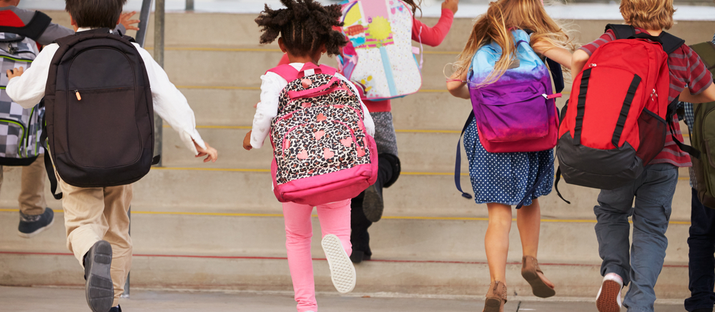Do you have kids? If so, we have something in common. I have school aged children, ages 9 and 4. The youngest will start kindergarten this year. The oldest will enter grade 4. In my opinion, the last 2 years have been a mess for school – even with all the best efforts and choices and options that have been provided, my eldest just isn’t learning well with all the disruption and changes.
My youngest, however, has not known school prior to COVID. He will start all-day kindergarten this fall. And well, he will enter a new environment that has a lot of rules! The Ontario government has outlined how kids will stay safe with Delta variant circulating in the community but with so many boards and public health units, it gets pretty confusing for parents to know what to do and where to put one’s energy.
Before sharing my tips for parents to prepare their kids for back-to-school this fall, I want to start with staying grounded about the importance of school to a child’s development. Let’s review!
Primary and Junior School
These years are focused on the development of children in terms of getting the basics down, such as reading, writing and math. Many children are learning fundamental skills that will be needed throughout life, including social skills, creative expression and how to coordinate their bodies. School has a role in developing more than just knowledge for children.
Secondary School
While adolescents are eligible for a vaccine, it’s not mandatory for students or teachers to be vaccinated ( just yet anyways…but yeah there’s lots in the media about this topic right now). The learning focus is on increasing specialization of the student’s talents and interests. But in the process of learning, adolescents are developing their personhood. Students can pick their own classes and are more accountable to their schedule, homework and grades. In highschool, a student can fail a class, adding some pressure to performance. Additionally, adolescents are starting the natural development process of separating from their parents and becoming more concerned with their peer group. Many teens have not attended school with their friends in a long time and will need to reconnect and re-confirm their own identities through their peer interactions.
Transitions – How to help your child or teen prepare for back to school
No matter how the pandemic has affected you, your work, or how much time you have, a child that has the support of a parent will far better during a time of stress than one that has to manage alone. Even a little bit of focus on preparing your child for school will help your child’s behaviour remain as calm as possible for the transition back to school.
Before the first day back – Warm up that brain!
The summer routine just isn’t the same. Camps, vacation, no homework, late nights out and breaks from obligations change what your child’s brain expects. In the week or two before school starts, add some of the ‘normal’ routine back into the day. Here’s some things to focus on.
- Sleep – Get kids back into a regular sleep cycle starting, at minimum, the Labour Day Long Weekend. Sleep happens best when there is a predictable routine, and one of the major benefits of sleeping well is a better immune system
- Hygiene – Let’s face it; COVID has let us all be a little less worried about how we look and smell. Get kids and teens (especially as hormones are changing) to bath daily, change into clothes at a regular time in the mornings, and brush their teeth twice-a-day.
- Lunch time – Are you kids going to school for in-person learning this fall? Start to plan some lunches with them now. A menu that plans for 2 weeks can easily be rotated throughout the year. Teenagers may need to adapt to making their own lunches and bringing healthy snacks for steady blood sugar needed to focus. It’s not clear that school cafeterias will be open in all school boards.
- Family obligations – If your family expects children to help out around the home, make sure you get that in your child’s routine before school starts. I know it can be a family-by-family decision about how much your child contributes to the household functioning, but forgetting to add this back into the schedule before school starts may mean your child just doesn’t ‘have the time’ later. If it’s important to your family that your kid helps out, make sure the time and expectation to do so is integrated before the first day of class.
- Online experience -If you’ve chosen the option of virtual learning provided by the Ministry of Education and your local school board, make sure your child has the tools set up and ready to go. They will need a computer with video and microphone integration, and reliable internet access. Three to five days prior to the start of the first day, have your child use the computer as if they needed to sign-on. This will help your child’s brain find the online learning patterns that were used about 8 weeks prior.
- Agenda – Help your child stay organized and get a school agenda. When an older child or teenager choses one themselves, it is more likely to be used. Encourage creativity with different coloured pens, markers and stickers. Teach your child the date that school starts and make this an exciting time for younger kids, especially if starting kindergarten.
First few weeks of school – Breathe, listen and finish the paperwork
- Breathe – Anyone dropping-off kids will need to breathe through the bumps (and, ummm – utter chaos?) of the first week back. Make sure you take the time you need to stay calm. Zen parent, zen child, as they say.
- Paperwork – In addition to the daily COVID screeners needed for in-person learning, be prepared for the paperwork that comes home the first week. Have a spot in the home that everyone knows is the place where forms are to be left for your completion. Remember to book time in your own schedule to complete that paperwork before the end of the first week. You will need to entrust your child to bring it back, so have an envelope ready for each kid.
- Active Listening – Be a great listener of what your child is telling you. Many parents know the importance of the trip home from school – for some reason, kids will open up during this time – perhaps it’s the informal nature of the moment. Make the travel-home-time your connection time. When you can be the safe place, a child is able to more effectively manage their own worries.
So there you have it. Some practical techniques, tips and strategies to help prepare children for the new school year. Of course, not all things go according to our best intentions. Sometimes it’s still a struggle (or a battlefield!). Being Therapy can help you ease the stress with some personalized care. We also work with teenagers, starting in Grade 11, to cope better and prioritize wellness. Give us a call today!



